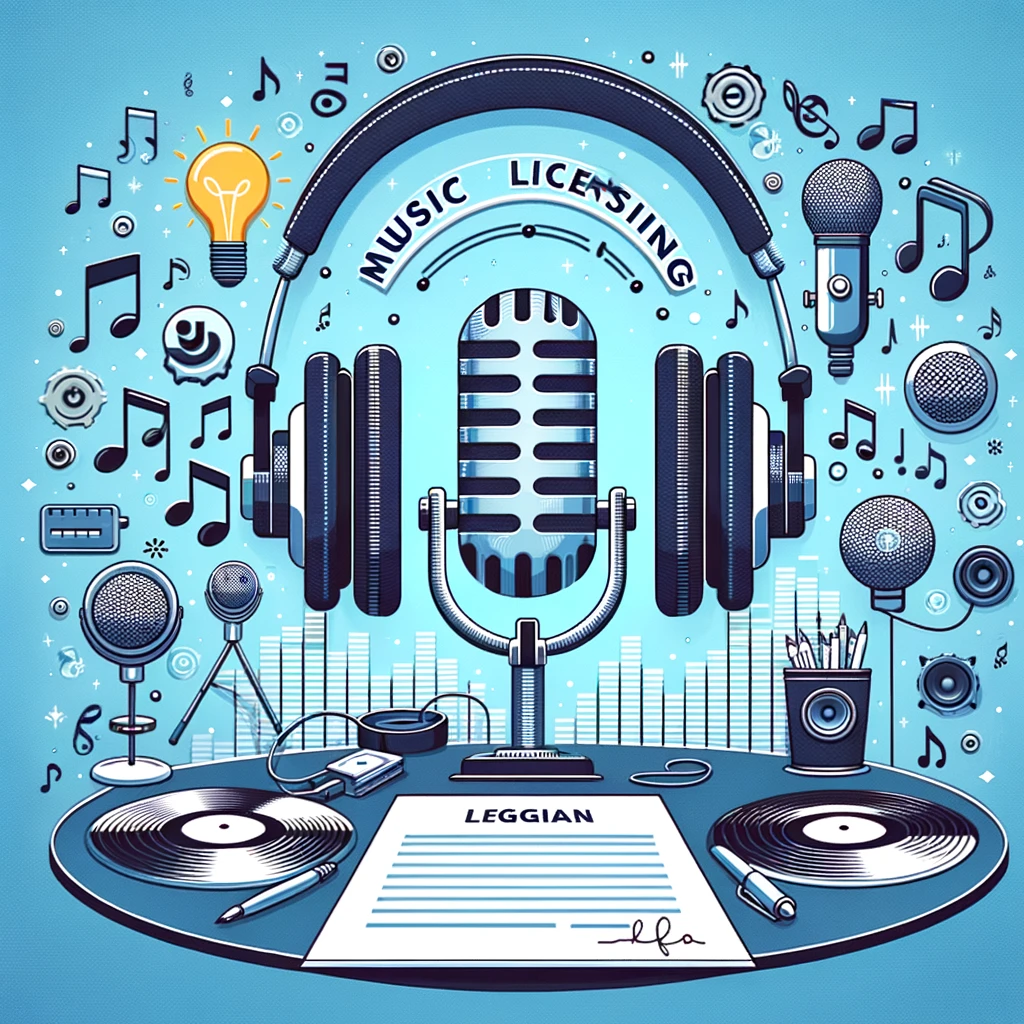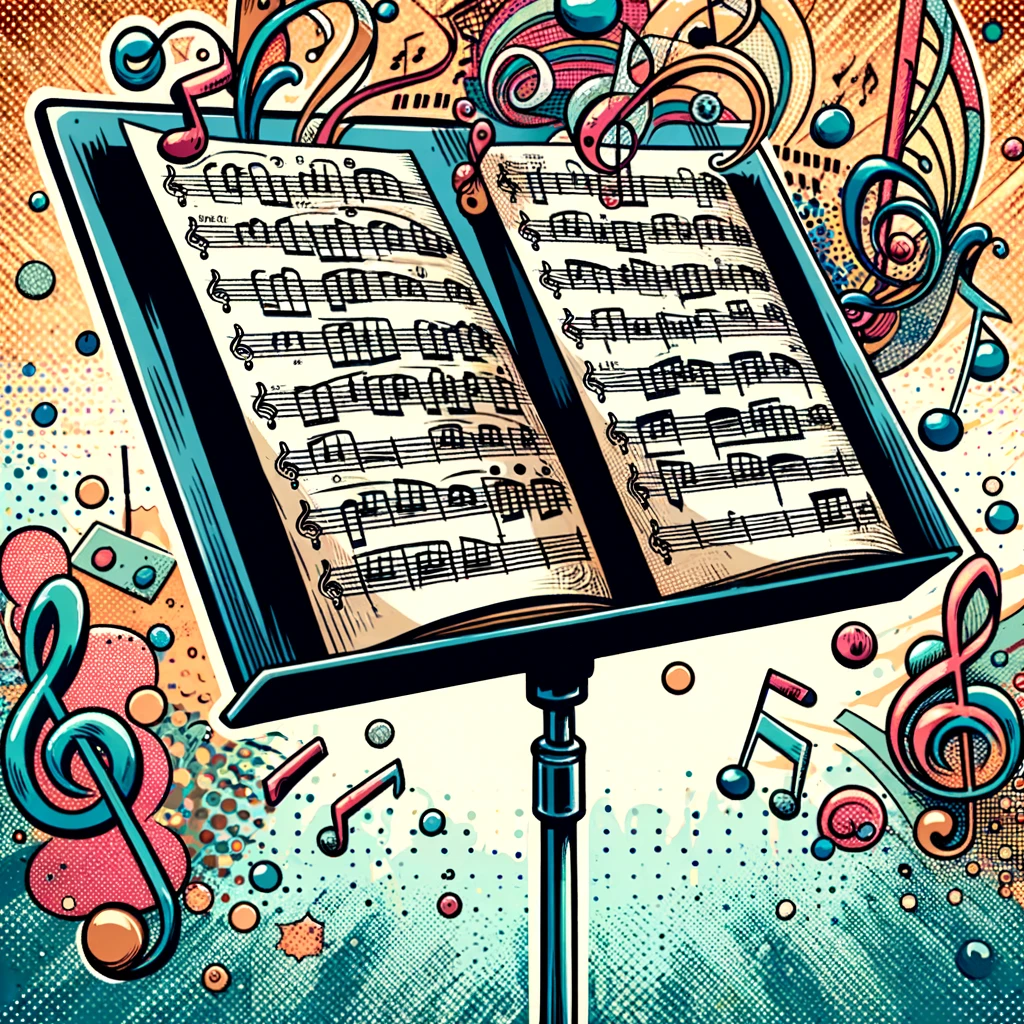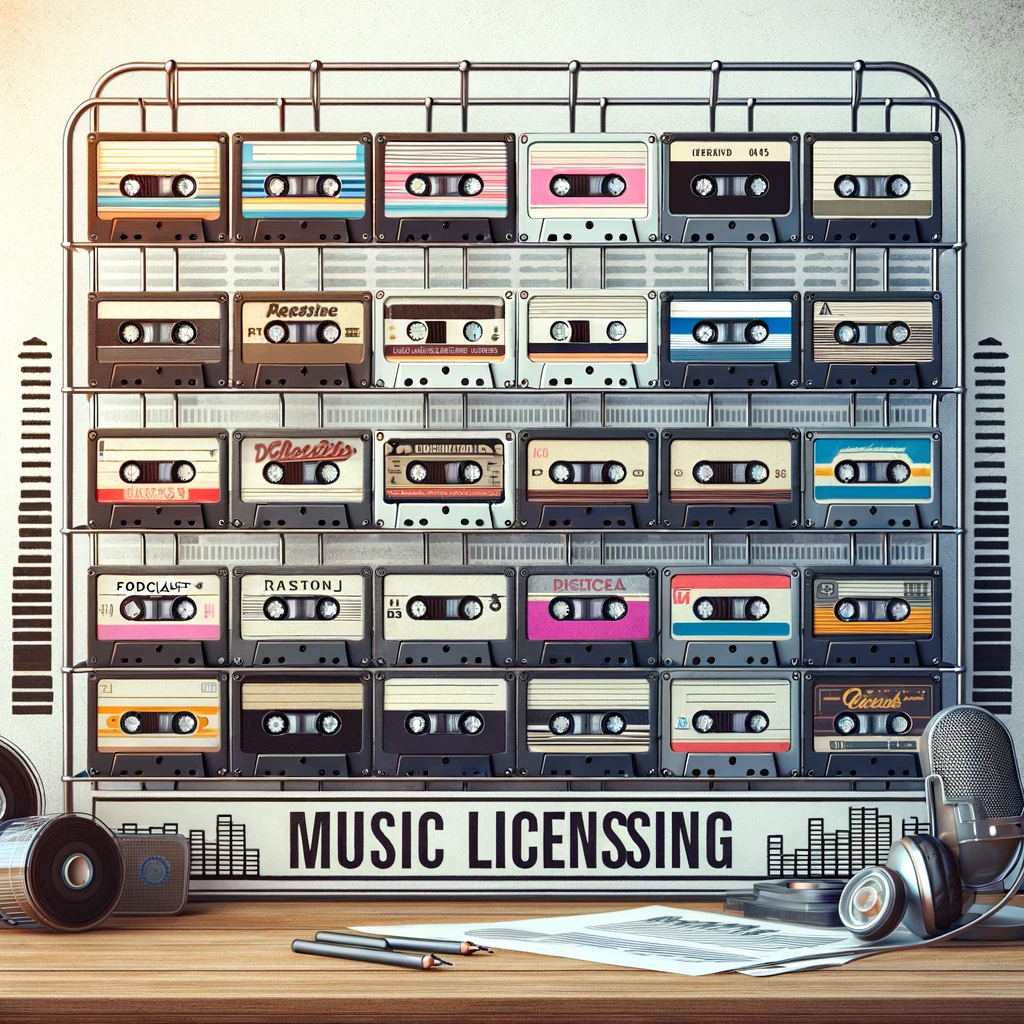
How To License Music For a Podcast
Using music in a podcast seems simple enough. You find the song you want, download it, and mix it into your episode, within your DAW. Then a few weeks later you get a cease and desist email and notice that your episode was pulled offline.
Sound familiar?
If so, it’s probably because you didn’t get the rights to use the music. In order to use a copy written song in your podcast you need to purchase a music license.
In this post, I’m dropping some insight into what music licensing is, and how to license podcast music.
Defining Music Licensing Jargon
Before we dig in, I want to define some terms. These are some common terms you might hear when it comes to licensing music for a podcast.
Royalty-Free
Music that’s completely unregistered with performing rights organizations, such as ASCAP and BMI. Meaning there are no royalties generated when the music is used.
More colloquially speaking, royalty-free has become a term that’s used for music in which the production doesn’t have to pay any sort of royalties to the artists.
Also, royalty-free is not to be confused with free, as in, you don’t have to pay for the music at all. That’s a very important distinction.
Music Libraries
A music library is a catalog of music, that’s been specifically created for media use.
A one-stop source music library is when users can access and use all the songs in a music library by paying a fee. This fee could be monthly or a one time payment.
If you were to license music, like a song you hear on the radio, you actually have to acquire two different licenses for that song.
You need to have a license that covers the right to use the physical recording of that song, as well as a license that covers the publishing side of that song. The publishing represents the songwriter’s interest.
The physical recording vs. the publishing can be thought of as the notes on the page, vs the recorded music.
So, typically a record label will represent the physical recording. A publishing company will represent the publisher’s side, aka the notes on the page.
You’ll have to negotiate a license for both sides. Once you’ve done that and you’ve gotten a license negotiated, now you’re able to use the song in your podcast.
So, a “one –stop song” represents all interests, representing both the recording and the publishing in one easy license by only having to reach out to one company (as opposed to reaching out to both a label and a publisher).

What is a Music License?
When it comes to podcasts, you need to obtain a synchronization license, which is actually the same license that you would obtain for a TV show, or a Film.
Although you’re not syncing the song to visual media, you’re synching the song to a large audio program. So, it’s the same mentality of synchronizing a song to a piece of larger content.
To obtain this license you’d reach out to the rights holders, to the people who represent the song (the label and publisher or if it’s a music library track, just the music library). This is what a music license is.
The Details Of A Music License For A Podcast
You really need to know what you, as a podcast production, are going to require from your music license, and what rights you’re going to require.
That’s all stuff that you’d be negotiating with the rights holders. For example, what’s the term of the license?
Is it going to be for three years only and then you’re going to pull the content down? Is it going to be for five years?
Or, are you going to leave the content up in what’s called, “perpetuity”.
Which is forever. In either case, the license would need to reflect the term. What media distribution rights will your podcast require? Will it require podcast / digital audio streaming and download rights only?
What territory will your podcast be distributed? In the US only? Will it be able to be accessed worldwide? How will the song be used in the podcast? These are all things you’ll have to include in your request for a music license.
Blanket Music Licenses
A blanket license is when you pay a flat fee to use unlimited songs across an entire episode, season, or series.
Usually, music supervisors will put a blanket license in place, and then create an additional budget for the bigger musical moments of an episode, where a well-known song(s) might be required.
The Role Of A Music Supervisor
A lot of people think that music supervision is a lot of listening to music and choosing cool songs. In reality, that’s about 15% of the job.
The bulk of the job is sorting out the rights of songs, and getting approval and clearances from the rights holders.
It’s a music supervisors job to know about the production, know what their needs are, understand their music budget, understand what rights that they require, help them find the song that works best for the scene, and understand how they’re going to use it.
A music supervisor helps the production navigate the entire music process from start to finish.
Something important to keep in mind, is that just because you want a song in a podcast, and have a decent budget for that song, it doesn’t mean you’re going to get approval from the rights holders.
You can send them a synopsis of how the song is going to be used or what the nature of the podcast is, but they may just not like the project.
Oftentimes it takes some heavy lifting to track down who represents the song and try and negotiate usage with them. The process is a lot of negotiation, contracts, and sorting out the legalities.

Budgeting For Podcast Music
There’s definitely been a pretty large evolution of the importance of music in podcasts. Now, there’s more of a focus on high end creative music. The budgets are starting to become bigger and the listenership is wider.
This is all happening because there’s more education about the value of music, and the costs associated with it. A music supervisor can help educate everyone involved in the production of a podcast about this.
The production is going to need to figure out what their music budget is. That’s going to drive a lot of the conversation about what they get access to.
Quality is the next thing. A music supervisor will help make sure the budget is aligned with the quality of music that the production wants.
If these two things are to far apart, a music supervisor will help manage expectations.
The last thing you want as a podcast production company is to have to scramble at the last minute and realize you don’t have the money for the music you want.
This leads to podcasters using cheap online libraries that offer monthly subscriptions.
This is wildly common in the podcast space.
Subscription Based Music Libraries
Although these are seen as sorta of “the bottom of the barrel”, there are actually some quality music libraries with this business model. I’ve licensed a ton of music from Epidemic Sound for my podcast, CLIPPED. I love their tracks.
Regardless, one of the really important things to consider is, does the music service offer any sort of protection for the production in the event that there’s a copyright infringement?
When you go to a lot of these cheaper platforms, there’s not as much quality control over what’s in there, and not as much creative oversight into what’s being put into the library.
This means there’s a lot more opportunity for there to be copyright infringements.
If there is a copyright infringement, it’s going to cost the podcast production company a lot of money.
Many of the more legit music libraries carry what’s called E&O insurance. E&O insurance is a professional liability insurance that covers any legal fees.
It’s best for a podcast production to do the research and make sure that if they use a song that gets flagged, the music library is responsible for dealing with the claim.
Budget Friendly Licenses For Podcast Music
In recent years, the big players, Warner Chapel, BMG, APM, and 5 Alarm, have figured out an affordable music licensing solution that caters to podcast companies.
So, all it really takes is reaching out to those companies, and you’ll likely be able to set up something that’s pretty comparable cost wise, to a lot of the cheap royalty free libraries.
These companies have realized the popularity of podcasts and are trying to keep up with the times.
Even major labels and major publishers who represent popular music are becoming more flexible in terms of licensing commercial music for podcasts.
There has to be some sort of a way for them to be able to cater to those productions and to be able to actually have that music available for the podcast space.
We’re going to be seeing a really different landscape in a year or two, where a lot of the major labels, and a lot of the major publishers are going to have a lot more of a consistent offering that meets the needs for a podcast production.
Hiring A Composer For Your Podcast
Surprisingly, it can be affordable to find a really great composer. You can have them create a theme song, you can have them create intros, outro’s, and a few different cues.
It’s best to hire a composer via a “work for hire” situation.
This way the podcast production company actually owns the music. When you own the music you can use it however you want, and as often as you want.
It gives the production a lot more flexibility when they’re in control of the rights. Additionally, if you go this route, you won’t have to license podcast music, because you’ll own the tracks.
License Podcast Music: Avoiding Legal Pitfalls
Next time you’re cutting some music into your podcast, make sure you have the rights to do so. Obtaining a music license not only covers your ass, it makes sure that the rights holders of the music consent to you using their tracks.
If you have questions about music licensing reach out to my boy Jonathan Lane. You can message him via his instagram.
Jon is a music supervisor and the founder of Clearly Music.
In this role, he licenses and places music in various podcasts and films. Some of his recent highlights include working on MGM’s Respect and House of Gucci, as well as Dear Media’s Back To The Beach, and Bone Mary Bury.
In addition, he’s also Pod People’s “go-to” music guy, for when they need to source music for podcasts.
To learn more you can also listen to Episode 17 of Clipped. In this episode, I sit down with Jon and we discuss the in’s and out’s of licensing music for podcasts.
Check Out Other Articles For More Podcasting Resources
- How To Get The Best Lighting For YouTube Videos
- Shure SM7B: Why Top Podcasters Love This Iconic Microphone
- Start a Podcast on YouTube: The Complete How-To Guide
- Three Ways To Launch a Podcast
Listen To Clipped – A Podcast Teaching Podcasting
- Boost Your Brand Growth By Attending Podcast Conferences
- The Art of Repurposing Old Podcast Episodes
- The Best Microphones For Podcasters
- Harnessing AI To Create Effective Short Form Podcast Video Clips
